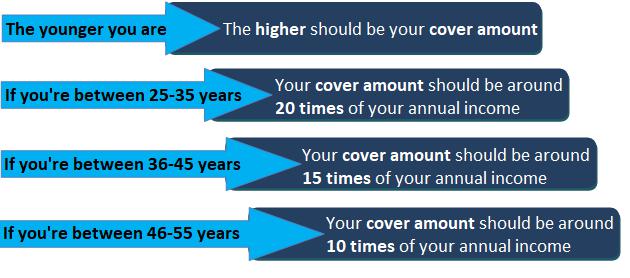
Written by
Updated :
Reviewed by
It was that time of the month again! It was time to pay the monthly bills. That evening, over a cup a coffee, my wife and I sat down to figure out our expenses. We wanted to know, where does the money go! Here’s a glimpse…
Monthly Income (after taxes) |
Rs.80,000 |
|
Monthly Expenses |
||
EMI on house loan (25%) |
Rs.20,000 |
|
Household expenses (20%) |
Rs.16,000 |
|
Credit card bills (15% - On other ad-hoc expenses like movies, shopping eating out and extracurricular activities) |
Rs.12,000 |
|
Bank deposit investment (12.5%) |
Rs.10,000 |
|
Cost of school fees (10%) |
Rs.8,000 |
|
EMI on car loan (5%) |
Rs.4,000 |
|
Total expenses |
Rs.70,000 |
|
Income after deducting expenses |
Rs.10,000 |
|
Contemplatively looking at the list of expenses, my wife anxiously asked, “Hardly much is left, isn’t it?”
“I know,” I said, “But I have been thinking. We really need to buy insurance.”
“What! Are you serious?” she said in a vexing tone. “Don’t we have enough expenses already? We will think about insurance later”
Trying to make a point, I said, “For a moment, just think if something were to happen to me, how would you manage? I know we could think about this later but isn’t it better to be safe than sorry. I’ve found a simple form of insurance, it’s called term insurance. It's neither complicated nor expensive. We can get a term insurance plan with a significant life cover at an affordable premium and the entire sum assured will be given to you in my absence. It's as simple as that! Let me explain, a 30 year old non-smoker male like me can get a life cover of Rs. 1 crore for 30 years by choosing Max Life Smart Term Plan (A Non Linked Non Participating Individual Pure Risk Premium Life Insurance Plan, UIN: 104N113V04) at a premium of Rs.873 per month (including GST and by choosing pay till maturity option). Additionally, we can also avail tax benefits under Section 80C of Income Tax Act.
Here, check this link. You can know the exact premium quote in 1 minute!”
She agreed and gave her verdict, “True enough, term insurance plans are simple and we can afford to buy one!”
I contemplated the next steps, acknowledging the fact that the process of buying insurance would be easier if I planned it right. Based on this, I discussed the process of buying insurance with a friend and found out that I need to consider 4 important things when buying a term insurance plan. I am sharing these pointers with you, to make the process of buying insurance easier, like it did for me.
Here are 4 considerations when buying a term plan -
1. Establish the cover amount
To make a decision on the amount of cover you need, you must assess and consider aspects such as:
1. Your age
2. Your financial responsibilities
3. Your family’s future financial requirements
4. Your basic expenses based on your lifestyle habits
5. The loans you are servicing today
6. Whether you are accounting for inflation and rising costs
Ideally..


2. Determine the policy period
a) Based on your age - Primarily, you can determine your policy period based on your age. Like my friend advised, “The younger you are the longer policy period would be advisable.”
For instance…
If you are in your 20s |
A term of 40 years or more is advisable |
If you are in your 30s |
A term of 30 years or more is advisable |
If you are in your 40s |
A term of 20 years or more is advisable |
If you are in your 50s |
A term of 10-15 years or more is advisable |
If you are looking to buy a high-cover and low-premium term plan it is advisable to buy at an early age (Because the younger and healthier you are the lower the risk you carry and hence insurance companies offer you higher life covers at very low premium rates at younger ages) |
|
Do note:
1. Once fixed, the premium remains the same for the entire policy period.
2. An insurance company typically covers people up to a maximum age of 75 to 85 years depending upon the product offered by insurers.
b) Based on when you plan to retire – If you have a retirement plan, then you can opt for a policy period till you reach the age of retirement, which is usually until 60-65 years for most people. This will ensure that the cover extends throughout your working years and your family is financially, secure in case of an unfortunate death of the earning member.
However, if you have not done any retirement planning, you should take the policy for the maximum period. I thought aloud, “How would I pay premiums after I retire?” My friend assured, “Don’t worry. There are insurance companies that offer a unique proposition.
You can pay your premiums only until the age of retirement, that’s until the time you are earning a salary. But the cover extends beyond 60 years of age! Interesting, isn’t it? Check out this plan now!”
c) Based on your other financial responsibilities – Depending on your other financial commitments and when they are due, you can decide what policy period is suitable. For example, if you have taken a house loan for 30 years, it makes sense to have a term life cover for at least 30 years so that the family is protected from any financial burden in case of an unfortunate event.
3. Find suitable payout options
The premium amount of your policy will depend on the payout option you choose. You can opt for a lumpsum payout or a regular monthly income payout (if available in your plan). You should choose the payout option as per your requirement and feasibility as the premium also varies depending upon the payout option you choose.
4. Select the right insurer
With many insurance companies offering different types of plans in the market, it is very important to choose the insurance partner that best suits you.
When deciding on your insurer, do some basic checks. Check for their claim settlement ratio, solvency ratio, financial background and market reputation.
1. Claim Settlement Ratio – The claim settlement ratio or clams paid ratio of an insurance company is the % of claims that are paid/settled. It is advisable to select an insurance company that has a high claim settlement ratio
2. Solvency Ratio – The solvency ratio of an insurance company is its ability to meet its long-term liabilities. Selecting an insurer with higher solvency ratio is advisable as it indicates financial strength.
3. Financial Background – Find out the financial background to ensure the insurer has the ability to take care of it short-term and long-term liabilities in case of a crisis.
4. Market reputation – Find out the market reputation of the insurer to know more about aspects such as the number of customer complaints and grievance ratio.
I was thankful to my friend for equipping me with all this information. It definitely made it easier for me to decide what type of insurance plan was best suited to my needs.
Term insurance was surely the way to go. I reiterated the rationale behind my well-informed decision of choosing this term insurance plan.
1. Firstly, as the only bread winner in the family, the value of my earnings would be secure
2. Secondly, it would secure the financial future of my family members with a significant amount of life cover
3. Thirdly, it also provides tax benefits
4. Fourthly, if I also opt for critical illness benefit, a 100% payout of critical illness sum assured is ensured. Not only that, if I opt for an Accident Cover option and in case my death occurs due to an accident an additional amount equal to Accident Cover Sum Assured is also paid to my nominee(s) over and above the Base Sum Assured.
After signing on the dotted line I could see the satisfaction on my wife’s face. Giving more than an appreciative hug, she quipped, “Well! Am I glad I married you! You’ve got me covered on all counts!”
What about you? Are you equipped with all the information to make a right decision? Do you know what type of insurance plan is best suited for you? Get a Quote Now!
ARN: Jan21/Bg/28C


